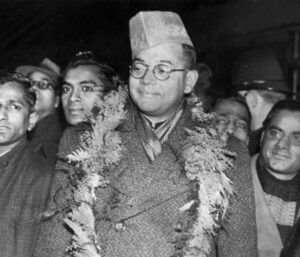News Desk, Kolkata : Netaji Subhas Chandra Bose arrived at this house, staying for two nights and three days. His presence still lingers in the lanes of the suburban town, untouched by the passage of time. The grandeur of his arrival echoes through the corridors, as if preserving their dignity. In the heart of Baruari, stands the house of the freedom fighter Gunendranath Mukhopadhyay. Netaji graced this abode, leaving behind memories etched in the iron-clad walls.

The house, a repository of history, has weathered the test of time. Certain artifacts have succumbed to the inevitable decay, yet the Mukhopadhyay family meticulously safeguards the handwritten letters from Netaji himself. Those letters, etched with a mantra to liberate the motherland from the clutches of the British, stand as a testament to a pivotal moment.
It was the 29th of December in 1931 when Netaji arrived in Katwa. Three days later, on the 31st, he bid farewell. Those three days became an everlasting legacy for the Mukhopadhyay family. The very iron stairs that Netaji climbed, now carry the weight of memories. The upper room, where he sought respite, and the courtyard where he ate and rested, are imprinted with the echoes of the past. The aged walls of this house whisper tales of struggle and sacrifice.
A plethora of stories unfolds within these walls – the iron stairs now laden with rust, once carried Netaji to the upper chamber where tranquility prevailed. Despite the wear and tear, the family preserves the sanctity of those moments. The iron steps, now rusted, symbolize not decay but resilience, much like Netaji’s spirit.
In 1931, the 29th of December marked Netaji’s arrival in Katwa, and on the 31st, he departed. Those three days bestowed upon this family a lifetime of riches. The iron stairs that once echoed his footsteps now cradle memories of his legacy. The care with which the family tends to the artifacts speaks volumes about the reverence they hold for Netaji. Every item he touched, every space he occupied, resonates with history.
Netaji’s brother, Shishir Bose, also graced this house. Raghunath Mukhopadhyay, a family member, recalls, “Katwa was a significant place during the independence movement. Netaji came to ignite the spirit of the freedom fighters. My grandfather, Gunendranath Mukhopadhyay, was a part of that movement. Netaji visited our house, and my grandfather cherished his association with him. Even my great-grandfather, Gundenath Mukhopadhyay, was blessed with his presence.”
Every year, on the 23rd of January, the family raises the flag in honor of Netaji. It’s a ritual, a gesture of respect that transcends time. Raghunath Mukhopadhyay proudly states, “We celebrate Netaji’s legacy every year by hoisting the flag. It’s a small way of paying homage to him.”
As the Mukhopadhyay family opens the doors to their ancestral home, the echoes of history reverberate through each room. The legacy of Netaji Subhas Chandra Bose lives on, not just in the faded letters and rusted iron stairs but in the hearts of those who continue to honor his memory. Netaji’s brief sojourn in Katwa left an indelible mark, turning a simple house into a shrine of history.
DISCLAIMER
Our news media denounces any form of bias and disapproves of sensationalism. The disseminated news is entirely educational and aimed at social awareness. Our media maintains absolute impartiality, adhering solely to the purpose of education and social consciousness.